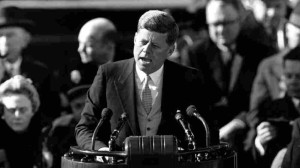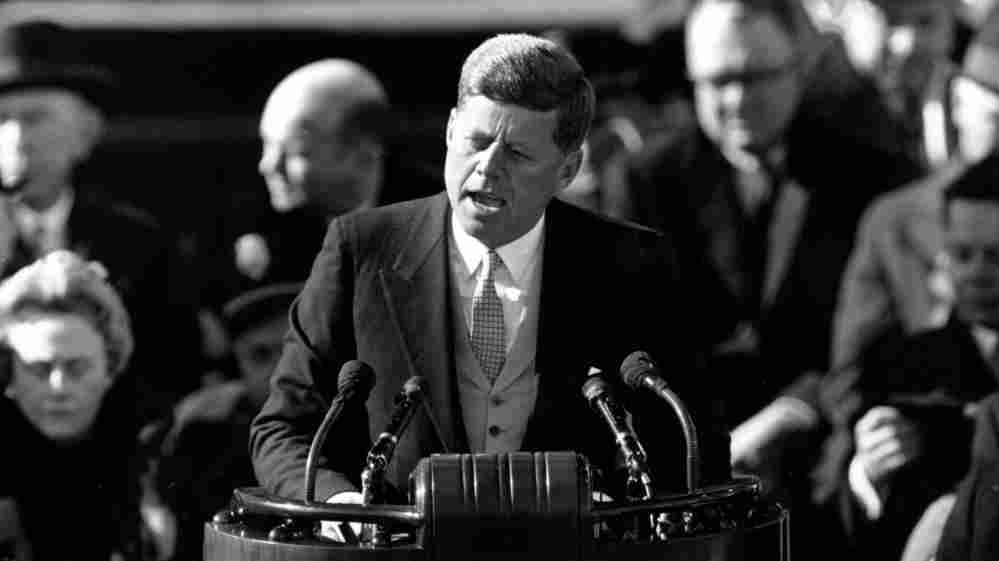John F. Kennedy’s watershed 1960 election as the first Roman Catholic president was a source of concern for many Protestant Americans. Others, such as former President Harry Truman, were less concerned about the influence of the Vatican on a JFK presidency. Truman at one point quipped: “It’s not the Pope who worries me; it’s the pop,” a reference to Kennedy’s influential and opinionated father, former U.S. Ambassador to England, Joseph P. Kennedy. 
A memorable Inaugural Address: On a bitterly cold and windy January 20, 1961, the 42 year-old JFK delivered what has gone down in the annals of presidential history as one of the most memorable, inspiring, and poetic of all inaugural addresses. Despite lingering concerns about Kennedy’s religion, he did not shy away from talking about God in his speech, following the tradition of previous presidential inaugural addresses.
5 key references to God: In two key bookend statements, Kennedy acknowledged God’s intervention in the world, interspersed with three other references to God and human freedom.
- First at the beginning of his address, he discussed the sacredness of the presidential responsibilities he was undertaking.
- He ended his speech by commenting on the interplay between the role of God and the efforts of people in bringing out a more just society.
- Within the inaugural address, Kennedy three times made the case connecting God and human rights in the world.
God and the Presidency: At the beginning of the address, after Kennedy’s acknowledgement of the gathered dignitaries and his fellow citizens, he stated the following:
“We observe today not a victory of party, but a celebration of freedom – symbolizing an end, as well as a beginning – signifying renewal, as well as change. For I have sworn before you and Almighty God the same solemn oath our forebears prescribed nearly a century and three quarters ago.”
Kennedy recognized that he taken not just the presidential oath required in the Constitution, but that by speaking the words of the oath of office, he was swearing before Almighty God to “faithfully execute the office of President of the United States.” His reference to the oath being a “solemn oath” came directly from the beginning language of the oath itself: “I do solemnly swear…” And Kennedy added four words to the end of the Constitutionally prescribed oath that have a long history and tradition of being appended to the oath by previous presidents: “So help me God.” Kennedy began his first and most memorable speech as president recognizing the sacredness of his presidential responsibilities.
God and Human Rights: Embedded within Kennedy’s inaugural address was his strongly and deeply held belief that basic human rights were a God-given right. In three sentences throughout the speech, Kennedy unpacked this belief.
- The case for freedom: Kennedy reminded his audience that the world is very different from what it was like when the Constitution was crafted. “And yet,” he told his listeners, “the same revolutionary beliefs for which our forebears fought are still at issue around the globe – the belief that the rights of man come not from the generosity of the state, but from the hand of God.” He brought up no new issue here, but one that hearkened back to the nation’s founding: human freedom and the basic rights of people is not the result of government programs, but something that comes from God. Perhaps he was thinking about the majestic words of the Declaration of Independence that “we hold these truths to be self-evident, that all men are created equal, that they are endowed by their creator with certain unalienable rights, that among these are life, liberty, and the pursuit of happiness.”
- The case against oppression: Speaking directly “to those nations who would make themselves our adversary,” Kennedy laid out a new vision of hope for cooperation between “both sides,” a phrase he used eight times in rapid succession. In a pointed reference to tyrannical regimes of oppression, he drew support from the language of the Old Testament prophet, Isaiah, that oppression was not part of God’s desires for the world. In a clear and forceful voice, Kennedy stated “Let both sides unite to heed in all corners of the earth the command of Isaiah – to “undo the heavy burdens…and to let the oppressed go free.” (From Isaiah 58:6)
- The case against “common enemies of man”: In one of the least recognized references to religion in the inaugural address, Kennedy used a phrase from the New Testament book of Romans (chapter 12, verse 12) without citing the book – a phrase with no mention of God. In the midst of humanity’s struggles against tyranny, poverty, disease, and war, Kennedy declared that “now the trumpet summons us again…to bear the burden of a long twilight struggle, year in and year out, ‘rejoicing in hope, patient in tribulation.’” It is this posture of “rejoicing in hope, patient in tribulation” from the New Testament that JFK seamlessly wove into the fabric of his speech.
God’s role in human affairs: Finally, in the closing sentence of the inaugural address, Kennedy articulated the delicate dance between the role of God in bringing about the type of society called for in the speech with the responsibilities of people to take action – the classic dichotomy between God’s sovereignty and man’s free will. He closed his 14 minute address with this sentence: “With a good conscience our only sure reward, with history the final judge of our deeds, let us go forth to lead the land we love, asking His blessing and His help, but knowing that here on earth God’s work must truly be our own.”
Kennedy’s religion a cause of concern? Kennedy’s inaugural references to God were fairly typical of what is expected in an inaugural address. To those who feared that his presidency would be one in which he took direction from the Vatican, the inaugural address should have served to put their minds at rest.


 Facebook
Facebook
 Twitter
Twitter
 LinkedIn
LinkedIn
 YouTube
YouTube
 Pinterest
Pinterest